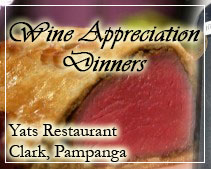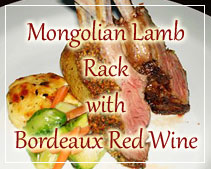How to master proper dining etiquette PHILIPPINES Restaurant and Wine Bar discusses fine dining etiquettes – 11August02
What is proper dining etiquette?
Learn proper dining etiquette whether you are the host/hostess or the guest. Place settings, silverware, and cutlery have a purpose and function for every meal.
n order to master proper dining etiquette, it is important to know the rules and follow them closely. Understanding the expectations that are placed on you is critical in your success of meeting them. The use of good table manners at all times is a necessity at any meal, but especially in fine dining engagements. Good posture, proper use of language, and showing respect are traits that are expected, but other things may also be expected that you might not be aware of. None of these skills are difficult to accomplish but they will require conscience thought and lots of practice so they become second nature. It’s important to remain calm and composed at all times to exude confidence and control of the situation, even if things seem to go off course.
Gloria Starr is the president of Global Success Strategies Inc. and has spent nearly 25 years consulting with business executives and dignitaries on the fine art of proper etiquette. Starr offers these tips on dining etiquette, “No one should sit down before the host or hostess pulls out his or her chair and seats themselves. The guest would then sit. The host or hostess would take the napkin out of the napkin ring and set it on his or her lap to indicate that the meal was about to begin. The guests cannot even have a slice of bread or drink of water prior to the host or hostess indicating that the meal is starting.”
When using cutlery or silverware it is important to begin with the outside pieces first and move in as the meal courses progress. It is important to learn each piece of cutlery and what its particular use is. Starr uses the following examples to explain, “If there is a salad fork on the outside, it means your salad is going to be served first. If you are going to have soup, there would be a spoon that is on the outside of the right hand side of the plate. The two pieces of cutlery above the main plate are for desserts.” Cutlery items should only be used for their intended purpose and should not be interchanged or used throughout the entire meal.
It is important to compliment the host or hostess when possible in a sincere manner that does not come across as simulated flattery. It is perfectly fine to say “this wine is exceptional” or “this is one of my favorite desserts” as long as you feel the statement is true. Never lie when giving a compliment; find another way to offer a genuine one later. Honesty is always the best policy.
When eating soup, Starr urges, “Put your soup spoon in the bowl close to you and move the spoon away from you. This helps with any problems of potential spills. This means that you are eating the soup away from you and then you are moving your head and your upper body toward the soup bowl, but not down into the bowl. Your body language is straight across and you are sipping the soup from the spoon on the side and not putting the entire spoon in your mouth.”
You should not ask for a replacement of your meal once it is served. If you have a special dietary need or concern it should be addressed prior to the meal preparation by inquiring if alternate selections may be served to you. Many people have medical restrictions or other specific preferences associated with their diets and this is becoming more common to address when group meals are being planned. It is recommended that you speak to your host or hostess in advance if you are diabetic, vegetarian, or have a specific food allergy that may present a conflict at the meal. In most cases, if you communicate your concerns, others will respect and honor your difference and do what they can to find a compromise to accommodate all parties suitably. You are not obligated to eat something you cannot or do not like, but you are not allowed to complain about the item that is served to you. It is okay to leave an item on your plate or politely refuse seconds or a dessert.
While the proper way to show that you are finished with a salad or entrรฉe is to place your utensils horizontally across the plate, this is not always the case with other serving dishes such as small bowls or sorbet cups. Starr notes, “There may be sorbet served between the fish dish and the main entree and that’s to cleanse the palate. When you have something like a sorbet, whether it’s for cleansing the palate or for dessert, you should not leave the spoon sitting in the sorbet glass because of the chance of tipping it over.” The proper way to handle the removal of plates and dishes between meal courses is to sit perfectly still. Starr warns, “Do not move from right to left in order to assist them or help them in anyway, because the reality is that moving would actually create a greater chance of spillage.”
Starr cites, “The old rule of etiquette was that the hands would only be on the table if you are actually eating. But the new rule in the last few years is that your hands are always seen, so the rule is called ‘always, sometimes, and never.’ This means that your wrists are always seen, your forearms are sometimes seen in the table area, and your elbows are never seen on the table. It would be rude if you put your elbows on the table, and the hostess or other guests would be equally as rude if they told you to remove them. This rule changed because of our global perspective. People from the Middle East keep their hands on the table, because if hands are under the table it is perceived to be underhanded, and they cannot trust you because they can’t see your hands. So it has been changed to accommodate different cultures.” There may also be cultural customs you should be aware of if dining abroad. Certain countries have rituals or behavior that is considered expected or unacceptable and these may differ from what is customary in our own country. If you dine with people from other countries you should research the recommended protocol to make the meal flow more smoothly and to avoid any pitfalls you may be oblivious to otherwise.
If you are have initiated the meal or been invited to the meal you should always show respect for your dining companion for making the time and effort to join you. It is important to give your full attention to them and the purpose of the encounter. Try to refrain from interrupting another speaker and pay attention to what he or she is saying. Do not let your thoughts wander to other topics so that you are not able to hear and understand what your companion is saying. The use of cell phones and pagers during a meal is often frowned upon as an interruption and sign that you are not willing to devote your full attention to the meal or conversation at hand. If you repeatedly excuse yourself from the table to attend to other matters your companion may feel slighted and think that you do not value his or her time. Smoking is considered impolite in the modern era as well, unless you are offered the opportunity and others are all in agreement with the act of having a cigar after dinner or a cigarette with drinks. Asking for carryout portions is highly inappropriate when you are a guest.
Starr laments, “There are things that so few people have: the common courtesy with ambassadorship skills and the way that Eastern people are more courteous, more dignified, and show grace and elegance under pressure.” American standards have plummeted with regard to using manners and etiquette when dining at home or in public. Dress codes have gone by the wayside. Many families let children eat alone in front of a television or video game and meaningful conversations are hard to come by during mealtime for many folks. Starr encourages, “If the average person just raised their standards by 1% a day, in 70 days they will be twice as good. To raise the standards you personally choose to use social graces; this would escalate your opportunities for success a million times over.”
With new golf courses springing up in and around Clark Philippines and an ever-increasing patronage by tourists from neighboring South Korea, Clark Freeport is short on hotel accommodation.
Even with the addition of 27 holes in 2009 and 2010, there is an acute shortage golf tee times for at least 5-6 months each year. Local players compete with frustrated (golf) tourists from Korea and China for tee times. Unfortunately Clark Philippines doesnโt have the luxury of vast tracts of land suitable for this type of development.
Mimosa offers 36 holes of championship golf, visitors can pay and play, busy during the weekends but not that difficult to get on or join up with a group to form a 4-ball. The new FAKCC offers 27 holes of world-class golf.
What many tourists and residents of Manila, Subic, Pampanga Angeles City and Clark Philippines found out over the holidays when they traveled out of town going north to Pampanga for a short getaway and a nice vacation was that there is a highly recommended hotel in Clark is also a very night out place.
This web site contains articles and information that will be helpful to visitors, residents and tourists traveling out of town from Manila on a short getaway to Subic, Angeles City, Pampanga and Clark Philippines. There are several web sites that contain information that might also be pertinent to what is happening in North Luzon, Subic, Tarlac, Pampanga, Clark Freeport Philippines.
Wedding couples looking for wedding reception venues and beach wedding venues can log on to this Philippines Wedding Venue web site for free information and assistance:
For assistance with lodgings, accommodations, hotels and resorts near Manila in Subic, Pampanga, Angels City and Clark Philippines log on to http://www.HotelClarkPhilippines.com
While in Clark, one might as well add to the itinerary a visit to the famous Clark Wine Center, the largest wine shop in Philippines which offers over 2000 selections of fine vintage wine from all wine regions, vintages spanning over 50 years covering all price ranges.
http://www.ClarkWineCenter.com
If this article about Clark is useful to you, please click here to contact us to tell us what more you wish to know about this article or Clark Philippines, which can be something about Clark investment, about Clark resorts, about Clark Swimming and Leisure or simply general news about Clark.
Please send questions to Editor@ClarkPhilippines.com. Leave your name, email address, contact numbers and we will get back to you as soon as possible. Information received will not be disclosed.













